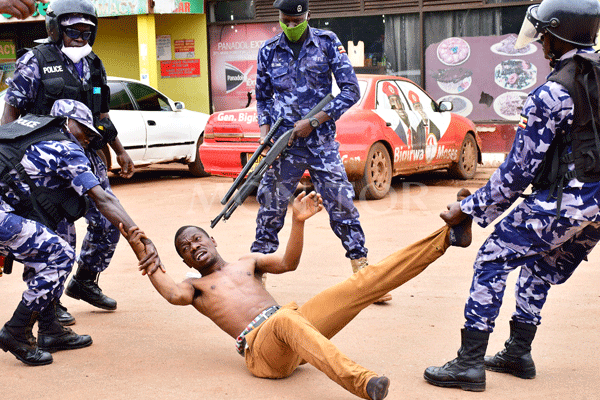Prime
Ethiopian forces killed 'at least 45 civilians' in January massacre- rights body

Ethiopian security forces patrol at street after Ethiopian army took control of Hayk town of Amhara city from the rebel Tigray People's Liberation Front (TPLF) in Ethiopia on December 16, 2021. PHOTO/AFP
What you need to know:
- According to the EHRC, security forces also rounded up and arrested an unknown number of people in Merawi on suspicion of being members of Fano.
Ethiopia's government security forces killed at least 45 civilians in a massacre in Amhara state in late January, the independent state-affiliated Ethiopian Human Rights Commission (EHRC) said Tuesday.
A statement said the EHRC had confirmed "the identity of at least 45 civilians who were extrajudicially killed by government security forces" in the town of Merawi for allegedly supporting an ethnic Amhara militia known as Fano.
"However, it can be assumed that the number of victims is even higher," it underscored.
At least 15 other people, including women, were killed during a door-to-door search by government forces in a different part of Amhara earlier in the month, the EHRC said.
The killings in Merawi followed months of clashes last year between Ethiopia's military and Fano and prompted the United States last week to call for an investigation.
According to the EHRC, security forces also rounded up and arrested an unknown number of people in Merawi on suspicion of being members of Fano.
AFP has sought comment from the federal government in Addis Ababa but has not received a response.
Fano members fought alongside government forces during the two-year war in the neighbouring region of Tigray but fell out after Addis Ababa signed a peace deal with Tigrayan rebel authorities in 2022.
After fighting broke out in Amhara last year, the federal government imposed a state of emergency in August that lawmakers extended by four months in February.
In a statement posted on X, EHRC head Daniel Bekele said the commission "reiterates call to end extrajudicial killings, ensure accountability & demonstrate commitment for peaceful dialogue by all".
International concern
Media access to northern Ethiopia is heavily restricted by the authorities, making it impossible to verify the situation on the ground.
But the United States last week said it was deeply concerned by reports of "targeted civilian killings" in Merawi.
In its statement, the United States also drew attention to "numerous disturbing reports of other violations and abuses... elsewhere in Ethiopia, reports which implicate government and non-state actors alike", urging all sides to enter into dialogue.
The Amhara violence reignited concerns about the stability of Ethiopia months after a peace agreement was signed in November 2022 to end the war in Tigray.
The peace deal fuelled a sense of betrayal among the Amhara, with the two regions sharing a history of land disputes.
Tensions escalated in April last year when Prime Minister Abiy Ahmed's government decided to dismantle regional forces across the country which triggered protests among Amhara nationalists who said it would weaken their state.
In September, the EHRC accused federal government forces of carrying out extra-judicial killings in Amhara, and mass arbitrary detentions in the region and elsewhere.





